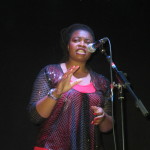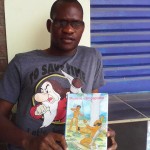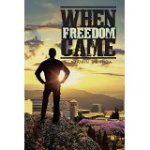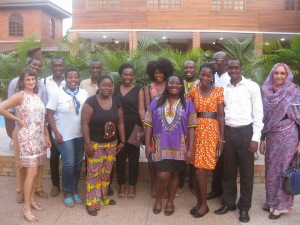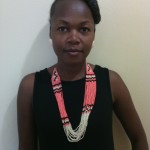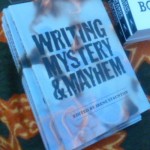![judith]() Judith grew up in Polokwane, South Africa. She lived in Bulawayo, Zimbabwe for two years before moving back to her hometown in 1994. She worked as a proofreader at a newspaper printing company and has since been a writing housewife. Her writings have appeared in Vision Magazine, Ancient Paths Christian Literary Magazine, The Kalahari Review and Brittle Paper.
Judith grew up in Polokwane, South Africa. She lived in Bulawayo, Zimbabwe for two years before moving back to her hometown in 1994. She worked as a proofreader at a newspaper printing company and has since been a writing housewife. Her writings have appeared in Vision Magazine, Ancient Paths Christian Literary Magazine, The Kalahari Review and Brittle Paper.
Informant
(Part 1)
I’ve heard of the word “ambiance”. I wouldn’t say The Waterhole had ambiance but it reminded me of an oasis in the desert… or a waterhole in the bushveld. Most of the locals were farmers – stock breeders. They were in the habit of leaving their caps (the ones that had the farm’s name embroidered on them) nailed to the wall behind the sleeper wood counter.
After doing the purchases, I returned to the cool, semi-dark interior of the pub where I handled the administration of the stock myself. You just couldn’t trust the first young girlie that came knocking for a barmaid position: They came and went like the flies in summer.
Later on in the evening, the pub was filled with rowdy customers. On nights like these, I played a mixed C.D. of artists of the eighties and turned up the volume. The smoke of the cigarette brands mingled and burned the eyes of the non-smokers. There was a non-smoking sign up a few months ago but the guys took it down while I was busy with the pub lunches.
Stewart was sitting in his usual spot, swaying on a barstool. He was telling anyone who would listen of the time he stuffed a streepsak[*] full of dagga in his fireplace when he thought the cops were after him. “That,” he said “was a bad idea – I hot-boxed the whole house.” I’ve had to ask him to leave a few times but Stewart was not one to bear grudges, he always came back.
I threw out one troublemaker later that evening and by one o’ clock, I was ready to lock up and go to bed. I waited for two guys at the pool table to finish their game. Stewart’s head was hanging on his chest. “Hey,” I slapped his meaty shoulder, “time to go.” Even though he looked very drunk, his eyes focused fine and his speech was not slurred when he asked to use the phone.
“No.”
“Please, man,” he glanced across the empty tables at the two guys, “I don’t have airtime.”
“Stewart, it’s one o’ clock in the morning.”
“I know – it’s urgent. Please, Ricky.”
“Richard,” I corrected him. “Fine,” I said, rubbing my eyes.
I polished the counter while Stewart whispered over the phone in the kitchen to a Mister Rapholo. The two guys lay their cues on the green felt, exchanged a complicated handshake and beat their chests in what seemed to me an immature way to end a pool game. Stewart staggered out of the door after knocking over a chair.
The next day, I left the girlie on her own in the pub while I had lunch at a steak house in town with an old chom of mine. After we ordered our steaks and chips, I leaned back in the chair and looked out of the windows at the parking area and who should I see other than Stewart.
He made his way to the door of the restaurant and sat in the far corner of the steak house with his back towards me. His faded shorts receded below what was considered decent coverage by even the most primitive of people. As I shook my head, a man who looked like a government official approached Stewart and pulled out the chair opposite him. I wondered where the guy managed to find a belt that could cover his girth. They greeted like old familiars. Stewart’s friend was carrying something in a folded plastic packet. “Another round,” the waiter announced while he opened our lagers and poured them into our glasses with just the right amount of foam near the rim of the glass.
“I think I should fire the girlie and get this guy at the pub,” I told my chom, Joe.
He shrugged. “You need something there for the guys to look at….”
I kept glancing at Stewart and his new-found friend… I don’t know if it was curiosity, or his exposed behind, or a sick mixture of both that made me look but I noticed that only the government official ordered. As soon as the plate of pap and chicken arrived, Stewart took the plastic packet on the table and waddled out of the restaurant on his gout-swollen ankles.
A few days later, Joe came to the pub for a beer.
“Do you remember the two guys who were playing pool here last week?” he asked.
“Humf, you mean the two city boys?”
“Ja, with the spiky hair,” he leaned forward, “they got arrested last night.”
“Sure?”
“Sure. For… um,” he looked around to see if anybody was listening, “for dealing in rhino horn.”
“Né?” I took a swig at the bottle. “Whose rhino?”
“Don’t know. Maybe mine,” he leaned back, “could even be mine.”
I shook my head, “You should know, Joe, because if you stand in the middle of your farm you can see all the animals on it. And those things you pointed out as rhinos looked a hell of a lot like ant hills to me.” Joe’s new money sometimes added tails of exaggerated length to all his stories.
That evening, Stewart was intent on getting drunk. He even bought a few rounds of Springbokkies for everybody. Word got around and soon, The Waterhole was filled to capacity. Some of the guys even had to stand outside, so they made a fire. I’m not one to complain about good business, but the women… As soon as even one person equipped with breasts so much as walked from the door to the counter, you saw – or felt – a change come over the guys. It was if the hairs on their necks bristled in competitive aggression towards each other as they stared at her back. She could be as ugly as a warthog but in no time, fists would be flying and I would have to sort things out.
Well, I could tell that this evening would be no different from the others. I soon asked three guys and a large woman in a tight tank top (her hair was bleached blond a few months ago and the dark roots clung to her skull like seaweed) to leave.
As I saw them out, a BMW with four passengers skid to a halt, throwing up dust near the fire – it floated before the headlights and deposited itself on the shoes of those seeking companionship in the solidarity of the flames. Amid a few curses slung in their direction, the four men brushed past me into the pub. The warm glow reflected off their dark, shaved heads. I hurried back to the counter – the guys would be happy to get rid of these gangster- looking Nigerians themselves if they didn’t behave. Business petered out by about only two o’ clock and the girlie was complaining about sore feet. I turned the music off and sent everybody home.
“Ricky,” Stewart stood up from the barstool.
“Go home, Stewart.”
“Ricky, can I use your phone?”
“Richard …” I rubbed one eye with my thumb and the other with my index finger, “You know what – there – use the phone. The sooner you get away from here the better for both of us.”
“Thanks, Ricky.”
I stood by while he had a short conversation with Mister Rapholo. “Hey, Ricky. Do you think those Nigerians will be back?”
“What? I don’t know, now get the hell out.”
“Okay, okay,” he put his hands up in primeval submission and backed away from me.
I grabbed the broom to clear the tiled floor of the evening’s ash, stompies[†] and broken glass shards and thought of Stewart and all the strange goings-on of late. He seemed to have eavesdropped on the two city boys who got arrested soon afterwards and then he received payment from some sort of government official… Tonight, he was asking questions about people I wouldn’t want drinking tea with my grandmother.
I swept the rubbish on a heap behind the counter where the girlie would see it the next day and locked up.
Outside, Stewart’s jaloppy was parked in its usual spot against the wall of The Waterhole. The side-mirror on the left and the passenger door were a different colour since the day he parked too close to the wall. He had replaced the banged-up bits with parts he bought at a scrap yard.
“Stewart… have you got car trouble again?” I asked.
He didn’t answer and I expected him to be passed out in the car. I was busy wiping the dust off the window with my jacket sleeve when I heard a groan. “Stewart?” I walked around the car and found him lying face in the dirt on the passenger side. His hair glistened and his collar was seeped in blood. The space between the car and the wall was cramped but I somehow managed to help Stewart to his knees and carry him over my shoulder. Army training was crap but it was something you never forgot. It was always under your skin, like fingernails I thought as I panted under Stewart’s weight. For a split second, I pictured Stewart on the back of my bakkie but hell, cold water could sort out anything, even if the seats were new.
Stewart’s eyes were already swollen shut and his nose looked worse than that cocky laaity’s a few weeks ago did. Where his shirt was torn, I could see blue-black bruises.
I thought it best to take him to the provincial hospital. I filled in the forms handed to me by the apathetic desk clerk and left him there. The doctor seemed good.
I went to visit him the next evening.
“What happened last night?”
The poor bugger couldn’t talk well and I missed half the story. I made out, though, that the gangsters ambushed him in the dark and beat him seven shades from Sunday. The bone in his left arm was splintered.
“Ricky …” Stewart’s eyes seemed watery, “I don’t know … If you didn’t show up when you did….”
“Ja, well …” I cleared my throat. “It wouldn’t have been good for the pub if they’d killed you.”
I stopped at the police station and opened a case file for Stewart. Constable Lesiba Semenya said he would stop by at the hospital himself to get a statement from Stewart. They were hot on the trail of four Nigerian men suspected of dealing in uncut diamonds and drugs and my description of them matched those of the suspects’. The girlie resigned as soon as I got back to The Waterhole, something about a boyfriend and unsafe. I wasn’t unhappy to see the back of her… I decided I would speak to the waiter at the restaurant as soon as I was in town again.
I needed to go to town a week later because the stock ran low. I first went to visit Stewart before sorting out all the other things – I knew I wouldn’t feel up for a visit at the hospital after I’d dealt with long queues, traffic, and incompetence at the wholesalers and the like.
Even though he still had a few superficial bruises on his face, Stewart was sitting up in bed with a Bible on his lap. He did not notice me.
“Whatchu doing, Stewart?”
“Hey, Ricky,” he beamed, “I was just thinking about you.”
I looked at the open Bible.
“A man came in here a few nights ago … Probably saw I had no visitors, I don’t know. He gave me this,” he looked at the Bible. “Ricky?”
I pulled up a chair.
“I was wondering … Could you take me to church on Sunday? I can’t drive yet with this arm….”
“Yes of course, Stewart,” heck, I figured it would be okay. I hadn’t been to church since a chom of mine got married a few years ago.
We drove with the passenger window open and Stewart’s cast and brace almost hit a few stop signs on the way there.
The church he wanted to go to was not like the traditional churches I remembered from my childhood. During the service, I’d been to the bathroom and as I approached the aisle we were sitting in, the preacher walked up to Stewart.
“Have you accepted Jesus in your heart, my friend?”
Stewart looked down at his clasped hands. He nodded at first, then shook his head.
“Come here,” the preacher led Stewart by his hand into the aisle. He turned around and kneeled in front of Stewart.
Stewart knelt as well, leaning on the preacher as he did so. The preacher embraced him and they prayed. I watched as the tears streamed down Stewart’s red cheeks. They were oblivious to everybody around them. The preacher and Stewart got to their feet – he said something to Stewart and hugged him.
Stewart’s managed to get his life back on track, so to speak. He’s become a tracker again, even teaches the local people about the veld and the animals. I still have to chase Stewart away from the pub sometimes because he’s got it into his head to preach to my customers.
(Part II)
The shade cast by the thatch roof of The Waterhole enveloped anybody entering it from the brightness of the bushveld sun. A paved pathway led you past a little decorative dam lined with rock art. The faint aroma of the dried thatching grass mingled with that of the tarred wooden poles and you knew you were home, even if the bushveld was never your home. The deafening love songs of the cicadas in the acacia trees faded as one walked up to the bar.
Around brunch time one Saturday, a woman from the city walked out of the sunlight into The Waterhole. It looked as if she hadn’t thrown on the first thing in her cupboard. Her hair was cut in a short bob and tucked behind her ears. She wore a long white gypsy skirt and high heels – very much overdressed for The Waterhole. She did not look left or right as she sauntered up to the bar, “A Lemon Spritz, please,” she said.
“Hey?” Quentin asked.
“Soda water with a sprits of le-mon,” she shaped her mouth on the last word, accentuating the syllables.
I continued to polish glasses while he scurried around in search of fresh lemon. Quentin was worth more to me than all the girlies that had ever worked at The Waterhole put together. He handled difficult women customers – they seemed to prefer him anyway. Also, I didn’t always have to worry about the male customers making insinuations of a sexual nature to Quentin. Anyway, if they did, he could take care of himself. Quentin presented her drink to her, “Soda water with a slice of lemon,” he said.
The woman from the city smiled in a dissatisfied way and seated herself at a table close to the bar.
Quentin and I exchanged glances – he shrugged and switched the radio on.
Two of the locals planted themselves at the bar and their conversation drifted along the tides of Foreigners and Mallard Ducks when a tall guy came through the same door as the woman had. The light blue shirt he wore strained at the buttons around his midriff. My guess was that if you compared this oke to a photo taken of him in grade 1, the only difference would be that he would have grown taller and broader.
“Hello, Diane, you’re looking good. How have you been?” he asked in a loud voice. “I wasn’t sure if I was going to find you here.”
She gave the small smile I saw earlier and embraced him. “Hey, thank you. You look good too,” she touched her nose. “What have you been up to?”
He then launched into an eleven-minute recital about what he had been up to.
After my first yawn, another townie dressed in biker’s leathers showed up. He pulled up a chair and sat with Diane and the loud guy. They greeted him as Anthony. “Reunion?” Quentin asked.
I shrugged.
The loud guy, Neil, asked about the leathers.
“Oh, I worked at a scrap yard, saved up, and bought a caravan and a bike,” he answered.
“Hey, Richard,” one of the locals called me. They were munching biltong, cut into thick pieces with a pocket knife. “What would you do?”
“About what?” I asked.
“What would you do if you found mallard ducks at your dam? The guy from the Fauna and Flora says it’s an invasive species and we should shoot them on sight.”
“I would feed them pap.”
They looked at each other. “Why?”
“To fatten them up so I can sell them to you as chicken and chips.” I busied myself in the kitchen with preparations for the pub lunch. After the plates were out, I went back to the bar.
“Richard, we’re running out of change and Coke,” Quentin straightened up from where he was crouching under the bar to retrieve packets of coins. As I glanced over the patrons in a quick head count, my eyes caught Diane’s. She looked at me and then gave a slow smile. I grabbed the bakkie’s keys and rushed outside.
“Hey, Ricky,” Stewart called as he locked his car.
“Dammit Stewart, if it’s not the women inside, it’s you outside. What do you want?”
Stewart laughed. “Where are you going?”
“To town, to fetch change and Coke,” I said.
“I’ll help load the Cokes, if you want,” Stewart offered.
I managed to finish the errands in town in a little over two hours. When we got back to The Waterhole, only Diane and Neil were left from the morning’s reunion trio. A bunch of locals had drifted in, though, and it was busy.
“Am I glad to see you,” Quentin said as I packed the cases of cold drink in the storeroom. “That Neil-guy is tendering for a hiding.”
“Well, what’s the woman still doing here?” To me, the root of all evil was not money.
Quentin laughed. “Looks like she’s been waiting for someone.”
“Lucky for you I have this thing about swearing.” I offloaded all the cases and after I entered everything on the inventory, I helped Quentin in the bar.
“You know I’ve always loved you, Diane,” Neil was shouting.
“Neil, you’re drunk.” Diane looked at me over the rim of her glass. She did not bat her eyes like other women did.
“I tell you the truth, why don’t you beleev me?” to the dismay of everybody in the bar, Neil started sobbing.
“That’s it,” in four strides, I was at the table next to Neil, “time for you to go, buddy.” Neil nodded and I walked him out. Stewart had gone home so I phoned him to come and get the drunk. Stewart did stuff like that – he gave them coffee and what not.
Sometimes you saw them again, sometimes you didn’t.
Diane made herself comfortable on a bar stool. “I waited a long time for you,” she said.
“Listen, woman – I was busy.”
[*] grain-bag
[†] cigarette butts
 Dexter Zvicha is a fiction writer and political nerd. He is an MA and MPA graduate of the University of Delaware. He is interested in exploring the wild, grotesque and beautiful through poetry and short fiction. You can see more of his work on his blog thelitepassenger.wordpress.com or follow him on Twitter @LitePassenger.
Dexter Zvicha is a fiction writer and political nerd. He is an MA and MPA graduate of the University of Delaware. He is interested in exploring the wild, grotesque and beautiful through poetry and short fiction. You can see more of his work on his blog thelitepassenger.wordpress.com or follow him on Twitter @LitePassenger.